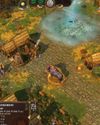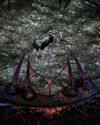
Many videogames furnish the player with godlike powers, but surprisingly few have tried to simulate the complete experience of being a god. A specific sub-genre of management sim that emerged in the late 1980s, god games lend players control not merely over a specific institution or social structure (like a theme park or a city). They give you power over reality itself, letting you shape worlds, create life and destroy both on a whim.
God games are dizzyingly ambitious, and perhaps because of this, only a sparse pantheon has ever been made. Even then, the status of many of these as god games is debatable. Many canonical god games either neglect to acknowledge your role as a god, or outright reject it, expressing the emergence of life through natural processes, rather than divine intervention.
The history of god games doesn’t start with a bang or a command. It’s more primordial, a confluence of ideas that merged and – dare I say it – evolved over decades. Bits of god games can be seen as far back as 1964’s The Sumerian Game, and 1968’s Hamurabi. Both these games cast players as Sumerian kings, tasking them with managing grain harvests in the face of random disasters. Then there’s 1983’s Utopia, a two-player game in which each player runs their own island, Utopia is credited as being one of the first games to include city-building and real-time strategy elements.
The holy spirit of god games looms large in the history of PC gaming. So take my disembodied hand, and let us wander through the (intelligently designed) history of this most divine of videogame genres.
Populous 1989
DEVELOPER Bullfrog Productions | PUBLISHER Electronic Arts
This story is from the {{IssueName}} edition of {{MagazineName}}.
Start your 7-day Magzter GOLD free trial to access thousands of curated premium stories, and 9,000+ magazines and newspapers.
Already a subscriber ? Sign In
This story is from the {{IssueName}} edition of {{MagazineName}}.
Start your 7-day Magzter GOLD free trial to access thousands of curated premium stories, and 9,000+ magazines and newspapers.
Already a subscriber? Sign In

A New Dawn - The rise, fall and rise again of PC Gaming in Japan
The so-called 'Paso Kon' market (ie katakana's transliteration of 'Pasonaru Computa') in Japan was originally spearheaded in the 1980s by NEC's PC-8800 and, later, its PC-9800.

MARVEL: ULTIMATE ALLIANCE
Enter the multiverse of modness.

SLIDES RULE
Redeeming a hated puzzle mechanic with SLIDER

GODS AND MONSTERS
AGE OF MYTHOLOGY: RETOLD modernises a classic RTS with care

PHANTOM BLADE ZERO
Less Sekiro, more Wo Long: Fallen Dynasty

STARR-MAKING ROLE
Final Fantasy XVI's BEN STARR talks becoming a meme and dating summons

THIEF GOLD
Learning to forgive myself for knocking out every single guard.

HANDHELD GAMING PCs
In lieu of more powerful processors, handhelds are getting weirder

FAR FAR AWAY
STAR WARS OUTLAWS succeeds at the little things, but not much else shines

FINDING IMMORTALITY
Twenty-five years on, PLANESCAPE: TORMENT is still one of the most talked-about RPGs of all time. This is the story of how it was created as a ‘stay-busy’ project by a small team at Black Isle Studios